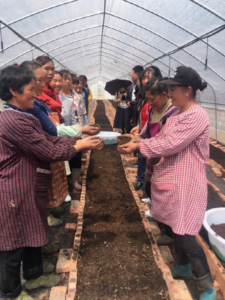- Species
- Rhododendron liboense
Rhododendron liboense
Known from a single location
The Critically Endangered Rhododendron liboense is only known from Donghua Karst Mountains of southern China, where destruction of its forest home and low levels of natural regeneration are threatening its survival.
Endemic to the Donghua Karst Mountains of southern China, R. liboense was originally documented from a single location with approximately 15 mature individuals. It grows on the mountain clifftops alongside bamboos and has striking pink flowers
R. liboense has extremely small seeds that are easily picked up by wind and blown to sites where conditions are not suitable for it to grow. This has resulted in the species having very low levels of natural regeneration. This has caused, alongside forest clearance for firewood, the species to become Critically Endangered. R. liboense is not known to be in cultivation and is therefore at great risk of being lost forever.
Discovered new populations
We worked to grow R. liboense in living collections, supplement populations in the wild and improved germination success.
Along with the College of Humanities and Science, Guizhou Minzu University and other local Chinese partners, we
- Surveyed the suspected species range to identify status of the species in the wild.
- Conducted research to improve germination success.
- Grown a large number of saplings, which were used to establish living collections at partner institutions and to supplement wild populations.
- Trained local villagers, forestry department and commercial plant nursery staff how to grow the species.
Expeditions into the Donghua Karst Mountains have discovered two new populations of R. liboense, bringing the total number of known mature individuals in the wild to 55. 300 seedlings have been successfully propagated with a survival rate of approximately 74%. A training course on how to grow the species was attended by 40 villagers, staff from the local forestry department and commercial plant nursery.
Project partners
Project sponsors





